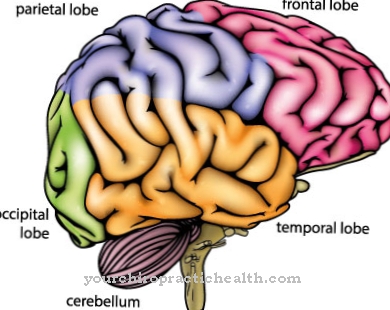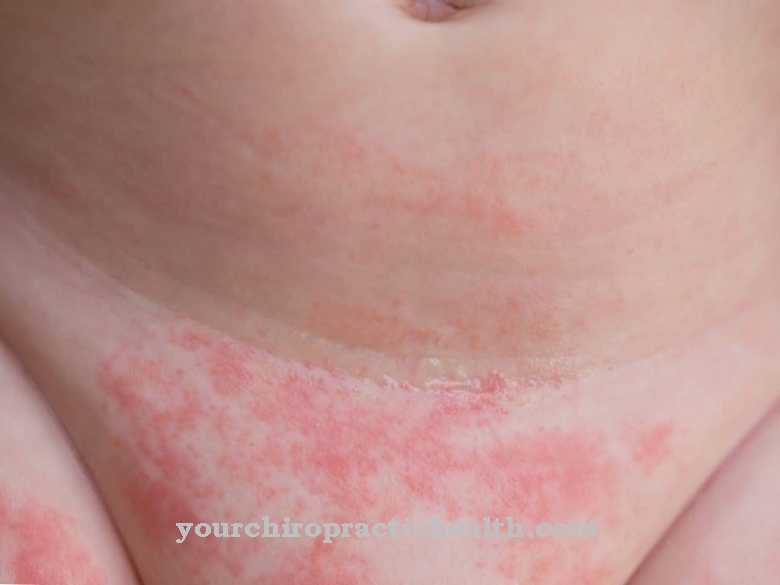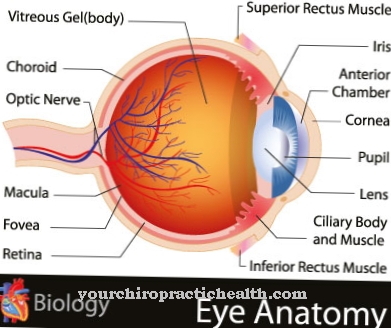The Allan-Herndon-Dudley Syndrome is a mutation in the SLC16A2 gene that changes the thyroid hormone transporter MCT8 and causes impaired iodothyronine uptake in muscle tissue and the central nervous system. Due to the mutation, those affected suffer from muscle weakness as well as mobile and mental development delays. AHDS is incurable and so far has only been treated with the administration of triiodothyroacetate.
What is Allan – Herndon – Dudley Syndrome?

Delays in the physical, mental or emotional development of adolescents and children are summarized as developmental delays or retardation. Developmental delays can have different causes. For example, the trigger for the delayed development can lie in the central nervous system.
This is the case, for example, with Allan – Herndon – Dudley Syndrome (AHDS). In addition to severe mental retardation, the syndrome is characterized by disorders of motor development. The first description of the syndrome goes back to 1944. The clinical picture you describe is a hereditary disease, i.e. a genetic disorder.
The disease affects male infants in the majority of all cases documented to date. The developmental disorders and their consequences are in almost all cases clearly visible from birth. AHDS is an extremely rare disease. For this reason, the state of research on Allan – Herndon – Dudley syndrome has so far been rather poor.
causes
AHDS is a hereditary genetic disorder caused by a mutation in the SLC16A2 gene. This is the coding gene for the so-called thyroid hormone transporter MCT8. This transporter mediates the uptake of iodothyronines in muscle and nerve tissue.
Due to the mutation, disturbances occur in the uptake of thyroid hormones, which upset the central nervous system and thus impair the development of the cells of the nervous system. Muscle tissue and brain become impoverished due to the mutation-related dysregulation of the active thyroid hormone on which they are actually dependent.
The syndrome is passed on as an X-linked recessive inheritance. Women can inherit the disease, but because of their double X chromosome structure, they rarely become ill. Sick men are unable to reproduce.
Although the mutation is genetic, in addition to this internal factor, external factors probably play a role in the onset of the disease. Due to the rarity and the limited research base, the role of these external factors has not yet been conclusively clarified.
You can find your medication here
➔ Medicines for muscle weaknessSymptoms, ailments & signs
Allan-Herndon-Dudley syndrome is a congenital disease that usually manifests itself in toddlers or babies. Those affected suffer from more or less severe muscle weakness. The children's muscle tissue is noticeably underdeveloped. The weakness of the muscles is soon accompanied by joint deformities.
Contractures are also frequent accompanying symptoms. The mobility of the children is increasingly impaired by the contractures and deformities. For this reason, those affected often appear unnaturally static or even motionless. Due to the mutation-related undersupply of thyroid hormones, those affected often also suffer from muscle cramps or make involuntary movements with their arms and legs.
Often those affected cannot move around independently. In most cases, the motor impairments are associated with severe mental disorders. For example, the majority of patients are unable to speak. In individual cases, AHDS can be characterized by many other symptoms in the area of mental and physical development.
Diagnosis & course
The doctor usually first suspects AHDS in the anamnesis. In laboratory tests, an increased T3 level with normal FT4 and TSH levels indicates Allan – Herndon – Dudley syndrome. Imaging of the central nervous system is usually part of the diagnosis.
Muscle weaknesses due to motor neuronal diseases can be excluded from the differential diagnosis. The prognosis for patients with Allan-Herndon-Dudley syndrome is relatively poor. So far, the disease is incurable. Studies have suggested that timing of diagnosis may play a critical role in patient prognosis.
Complications
Like all chromosonally inherited disorders, Allan – Herndon – Dudley syndrome cannot be treated curatively. The most common side effect of Allan – Herndon – Dudley syndrome - pronounced muscle weakness - can be treated with physiotherapy. Such treatment aimed at strengthening muscles can be painful for the patient.
Small children in particular often refuse therapy because of the pain. Despite intensive training, physiotherapy does not always lead to the desired success. It is similar with the speech therapy support of the Allan – Herndon – Dudley patient. Although the reduction in language ability can be improved with intensive training, the treatment does not always lead to success due to the mostly high-grade mental impairment of those affected.
Frustration on the part of the patient and a high burden on the entire family is one of the most serious complications in the treatment of Allan – Herndon – Dudley syndrome. Muscle cramps and movements of the extremities that cannot be influenced can be treated with the administration of muscle relaxants. Complications can be seen in the sometimes severe side effects of the drugs.
Fatigue, a general feeling of exhaustion and malaise are to be mentioned in addition to stress on the gastrointestinal tract. Long-term use of relanxants also damages the liver and kidneys. If Allan – Herndon – Dudley syndrome is not treated, those affected will not be able to make any significant progress in terms of their mental or motor skills.
When should you go to the doctor?
In many cases, direct treatment of Allan-Herndon-Dudley syndrome is not possible. For this reason, the treatment is mainly symptomatic and is aimed at the individual complaints and delays. As a rule, parents should then see a doctor if the child has muscle weakness.
This can become noticeable through exhaustion or persistent tiredness. Medical advice is also necessary if Allan-Herndon-Dudley syndrome slows down mental and motor development.
If the treatment does not take place in childhood, it can lead to considerable symptoms and restrictions in adulthood. A doctor should be consulted, especially if the patient can no longer speak. Treatment is also necessary for muscle cramps. If it is an acute emergency, you can go to the hospital directly or call an ambulance.
In most cases, Allan-Herndon-Dudley syndrome will be treated by a general practitioner or by a pediatrician. However, the individual complaints must be examined and treated by the respective specialist or therapist.
Doctors & therapists in your area
Treatment & Therapy
AHDS is a causally untreatable disease. Since there are no therapies available to correct the primary cause, the disease has so far not been curable. In the meantime, advances in the field of gene therapy suggest that gene therapy approaches will soon be approved for everyday clinical practice.
To what extent patients with the syndrome would benefit from approval has not yet been clarified. At the present time there is no established or standardized treatment option for patients with AHDS in the field of symptomatic therapy either. A few years ago researchers considered the administration of TRIAC to be a possible symptomatic therapy option.
TRIAC is a non-classic thyroid hormone, triiodothyroacetate. The administration of the hormone was carried out in a clinical study on affected children, but could not achieve any visible results. The results of the study are not necessarily meaningful because the administration of the hormone began relatively late.
For this reason, in 2014 TRIAC was still considered to be the best possible therapy. In one case in 2014, a significant improvement in motor and mental development was documented during treatment with TRIAC. The therapy was started on the affected person in early infancy.
The results of the studies to date thus indicate that the point in time at which therapy is started has an effect on the therapy results that should not be underestimated for patients with AHDS. Accompanying supportive therapies such as occupational therapy and physiotherapy or early intervention can theoretically be used to improve the quality of life and the skills of the patients. However, there is hardly any evidence of the efficiency of such an approach in connection with AHDS patients.
Outlook & forecast
Allan-Herndon-Dudley syndrome causes a number of different symptoms in most patients. First and foremost, those affected suffer from severe muscle weakness. This means that normal activities or sports can no longer be carried out easily for the person concerned. There are also major delays in intellectual and mobile development. The patient's concentration is clearly restricted and reduced.
There are still strong cramps in the muscles and thus often involuntary movements or twitching. As the Allan – Herndon – Dudley syndrome progresses, those affected can no longer speak. The patient's everyday life is significantly restricted by the syndrome and the quality of life is reduced. In some cases, the patients are then dependent on the help of other people in their everyday lives.
It is usually not possible to treat Allan – Herndon – Dudley syndrome causally. For this reason, treatment is only symptomatic. Those affected are dependent on various therapies, which, however, do not always lead to a positive course of the disease. In some cases, Allan – Herndon – Dudley syndrome limits the life expectancy of those affected.
You can find your medication here
➔ Medicines for muscle weaknessprevention
AHDS can only be prevented through genetic counseling. Mutation carriers can, for example, decide against having their own children.
Aftercare
The need for follow-up care for genetically caused Allan – Herndon – Dudley syndrome only affects male infants. The problem is that there is no suitable form of therapy for this hereditary condition. The severe consequences of defects in thyroid hormone transmitters can hardly be improved. Attempts to provide the affected children with relief by giving them special thyroid hormones have failed.
The problem is that the basis of the disease is usually already established in the mother's body. They permanently damage the unborn child. From this point of view, the treatment starts too late, namely after the birth. In the aftercare, only the damage that is already present can be treated. However, there is hope. In 2014, a case became known in which an infant with Allan-Herndon-Dudley syndrome was successfully treated with TRIAC. Follow-up care was still necessary because the child could not be cured. At least his symptoms were alleviated.
Allan-Herndon-Dudley syndrome is partly caused by a defective blood-brain barrier. This is what studies at Cedars Sinai Hospital suggest. The thyroid hormones cannot work due to the defective blood-brain barrier. This also applies to thyroid hormones that are administered after the child is born. Biotechnology or genetic research may be able to help. All attempts at treatment are currently failing. This also affects the follow-up care for severely damaged children.
You can do that yourself
Allan-Herndon-Dudley syndrome is a serious condition that has not yet been treated effectively. However, parents can still take some action to support therapy.
First of all, regular cognitive training and physical activity are important. A comprehensive therapy, which, depending on the severity of the syndrome, can consist of speech and reading training, but also of general brain exercises, also offers exercises from physiotherapy. The training must be individually tailored to the symptoms. The parents of affected children should therefore ensure that the measures are optimally chosen and that the child is not overwhelmed.
In the case of severe mental disorders, the child may need permanent support in everyday life. An outpatient care service can be an important relief for the parents. Inpatient treatment is just as important, which can be supported at home by regular monitoring of symptoms.
Parents should also take advantage of psychological counseling and, if necessary, also go to a self-help group, because contact with other affected people makes it easier to deal with the disease. In addition, parents often receive important tips on how to deal with a sick child.


.jpg)
.jpg)




















.jpg)



